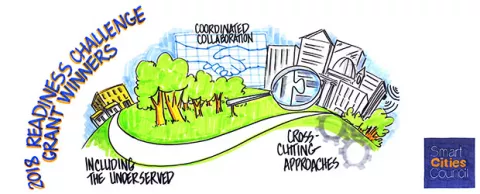
Since we launched the Smart Cities Council Readiness Challenge last year, we’ve seen cities make great strides. This year’s entrants are knowledgeable and committed, and they have large ambitions. They are moving beyond the ‘pilot phase’ to deploy strategic at-scale programs that will generate lasting benefits.
Read about their inspiring progress below. And make plans to join us at Smart Cities Week where you can hear from them directly. — Jennifer James
The Smart Cities Council has announced the 2018 winners of its Readiness Challenge: Birmingham, AL; Cary, NC; Las Vegas, NV; Louisville/Jefferson County, KY; and the Commonwealth of Virginia.
The winning jurisdictions in the second-annual Readiness Challenge shared three traits:
- They focused on breaking down silos to help departments provide better, more efficient service by working together.
- They emphasized coordinated collaboration, not just internally, but also with the community and nearby regions.
- They were also determined to use smart cities strategies to lift up underserved and vulnerable populations.
The five Readiness Challenge winners will receive a full year of expert, vendor-neutral mentoring plus an on-site Readiness Workshop custom-tailored to each community’s needs and priorities. They will also receive free products and services worth hundreds of thousands from leading organizations and Smart Cities Council partners, including Qualcomm, Battelle, SYNEXXUS, CompTIA and IES.
In addition to the five winners, Puerto Rico, which was one of the 10 finalists, was awarded its own special humanitarian grant in order to speed recovery after last year’s devastating hurricane.
Learn more about the five winners:
- Birmingham, Alabama
- Cary, North Carolina
- Las Vegas, Nevada
- Louisville/Jefferson County, Kentucky
- Virginia
Birmingham
Birmingham may be a mid-size city, but it’s working beyond its size by forging powerful regional partnerships. The city has found that it can multiply its own efforts by working with universities, neighboring cities, transit authorities, Alabama Power, and many others.
Birmingham will uses the Readiness Roadmap prepared by the Council to provide a collaborative framework for the many projects it has underway, including an Open Data portal, smart street lighting, community Wi-Fi, bus rapid transit, and a violence reduction initiative that uses data to spot problems early.
"This grant from Smart Cities Council will accelerate our Smart City Partnership, which is focused on using technology and data to improve public safety and overall quality of life in Birmingham," said Mayor Randall Woodfin. "Effective and efficient smart city initiatives are a conduit for amplifying growth and achieving equity. Birmingham is committed to having sustainable and inclusive growth, and the Smart Cities designation will enable us to put that flag in the ground."
Cary
Taking advantage of its location in the Research Triangle, Cary is using its Town Hall campus to incubate smart city technologies via public/private partnerships. Even more impressive, it is working to create “Destination Centers” in underserved neighborhoods to encourage more jobs and more housing.
Cary will use the Council's Readiness Workshop to further advance several of its projects, including "One Cary." This initiative seeks to gain a 360-degree of the city and its citizens by creating a single core platform to promote data sharing between departments and with citizens.
“Making more data-driven decisions is integral to the future of Cary, not just within the function of the government but also for civic engagement and transparency,” says Cary Mayor Harold Weinbrecht. “The resources provided by the Readiness Challenge Grant will be a huge help in our effort to gain a 360-view of Cary and our citizens.”
Las Vegas
Las Vegas is hard at work on an open and adaptable public safety platform to pull in data from many sources for "collective analysis.” The city’s dedication to public safety also extends to traffic and pedestrian safety. They have three pilot projects underway using video analytics to identify potential problems.
Las Vegas will leverage the Council's coaching and assistance to make its infrastructure smarter, towards its goal of becoming a fully connected smart city by 2025.
“Las Vegas is a leader when it comes to innovation and we thank the Smart City Council for this honor,” Mayor Carolyn G. Goodman said. “The city will utilize the mentoring, workshops, products and services provided in this grant to continue to be a testing ground for new technologies that improve safety and livability for our residents and visitors.”
Louisville/Jefferson County
The consolidated government of Louisville/Jefferson County has long been at the forefront of civic technology and understands that smart cities require smart infrastructure. The Council will help it craft a collaborative approach to use smart technologies to address challenges in transportation, telecommunications and public safety.
Louisville/Jefferson County is deploying 115 miles of new fiber optic cables so it can roll out smart city projects at scale throughout the region. Digital inclusion is also a priority — ensuring that vulnerable populations get access to broadband, computers and smartphones.
“A world-class city has to be positioned to understand and adapt to the world around us, especially in the fast-moving realm of technology,” said Louisville Mayor Greg Fischer. “That’s why our city’s Office for Civic Innovation has worked so diligently on projects like attracting Google Fiber and working with the app IFTTT to sync city data with smartphone apps, and smart devices, like internet-enabled light bulbs. It’s also why they’re focused on ensuring Louisville’s bright digital future is inclusive of all citizens, no matter the neighborhood they call home. This partnership with the Smart Cities Council will help us take even more big leaps into the future.”
Virginia
The Council believes that it is essential for states to take a "shared services" approach to smart technologies, so each town does not have to reinvent the smart city wheel. Virginia's Smart Communities Working Group embodies this — working hard to become a smart state government to achieve cost efficiencies and service improvements for the state itself while also lowering barriers for all Virginia communities.
Virginia will use its Readiness Challenge assistance to build a framework for its multiple initiatives, including expanding broadband throughout the state; adopting interoperability standards; setting out a cybersecurity and privacy plan; and creating sustainable funding for smart projects.
“The Commonwealth of Virginia is honored to be awarded this Readiness Challenge Grant,” said Virginia’s Secretary of Commerce and Trade, Esther Lee. “The grant will aid Virginia in supporting communities across the Commonwealth to improve livability, workability and sustainability through smart technology.”



